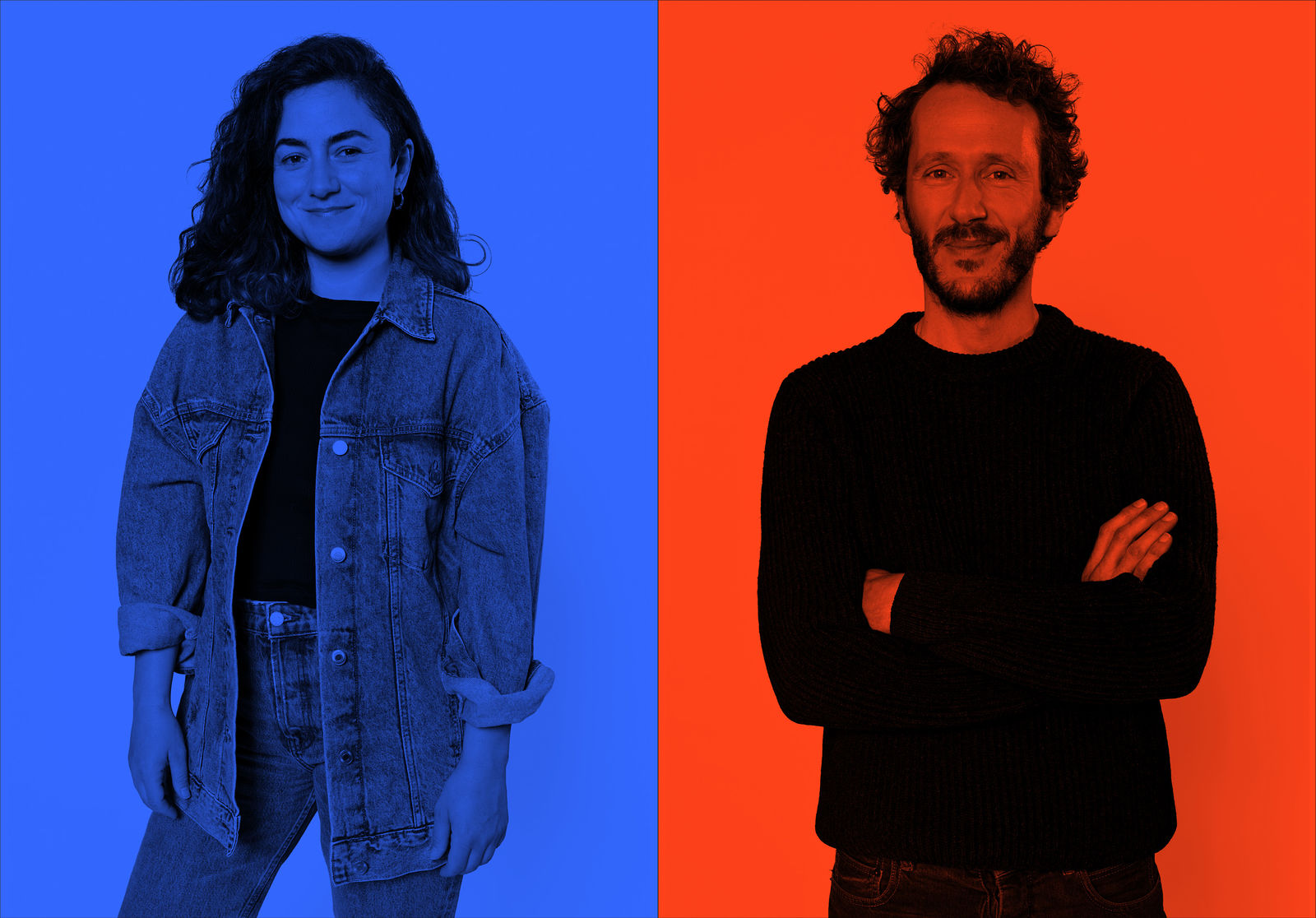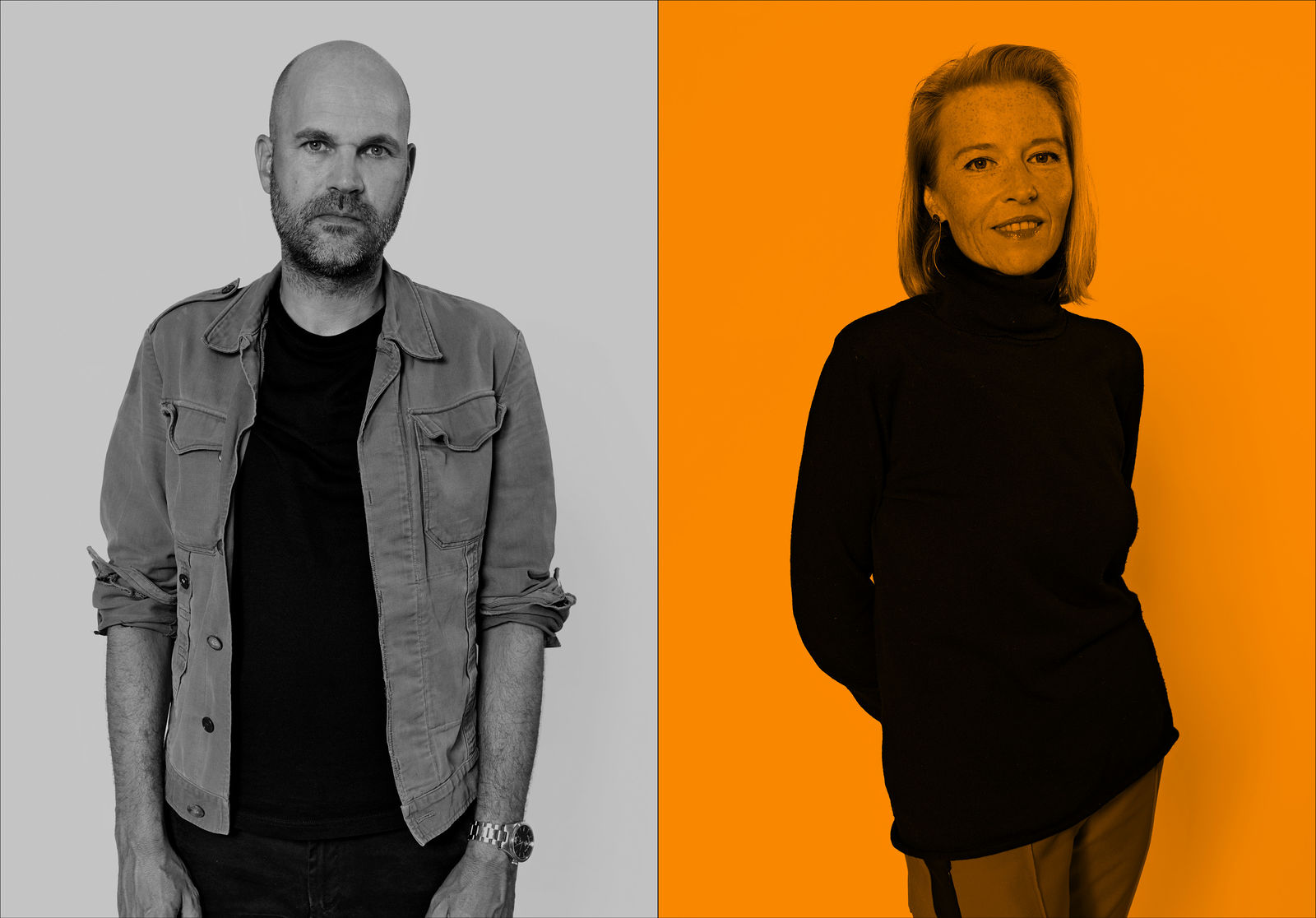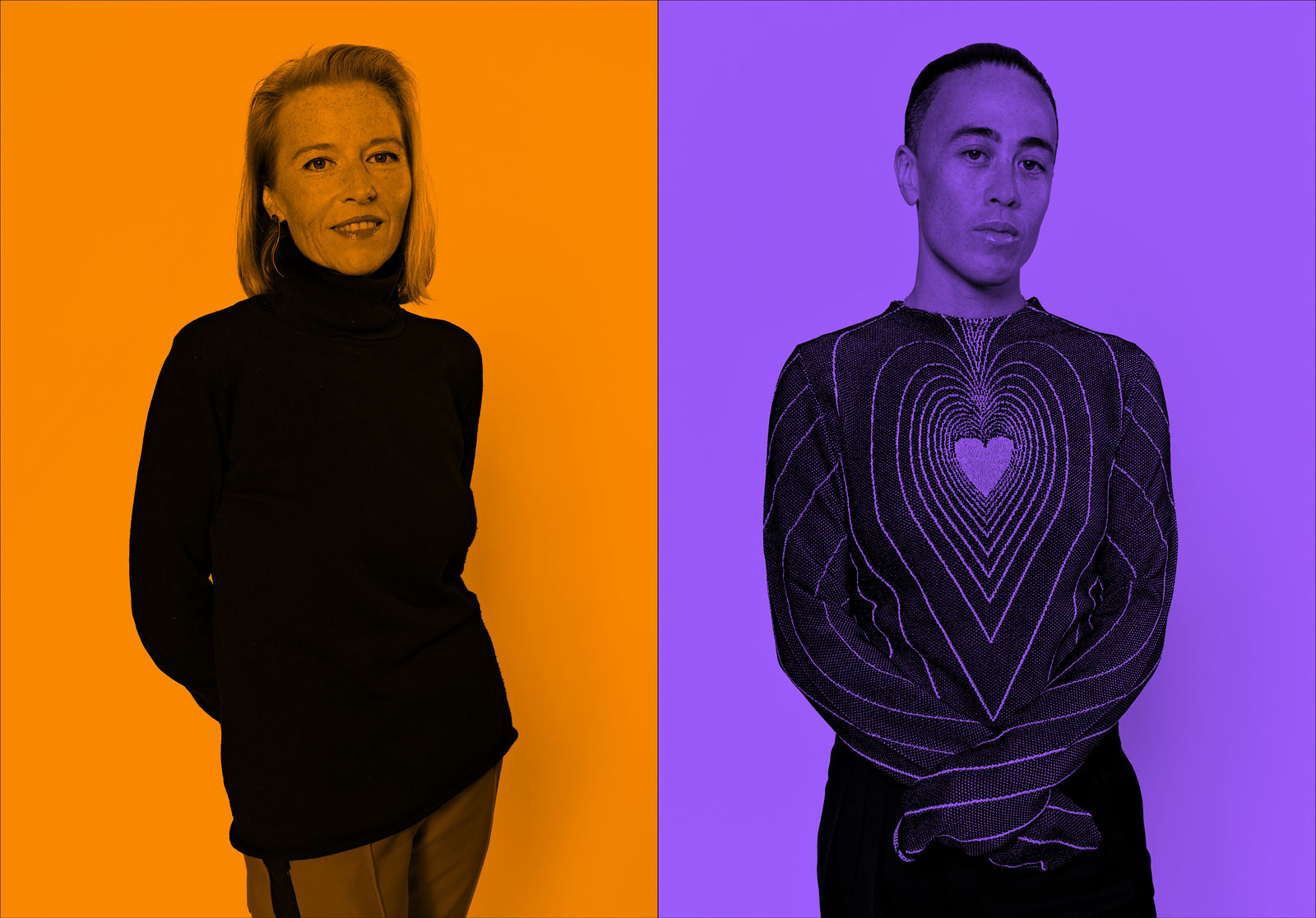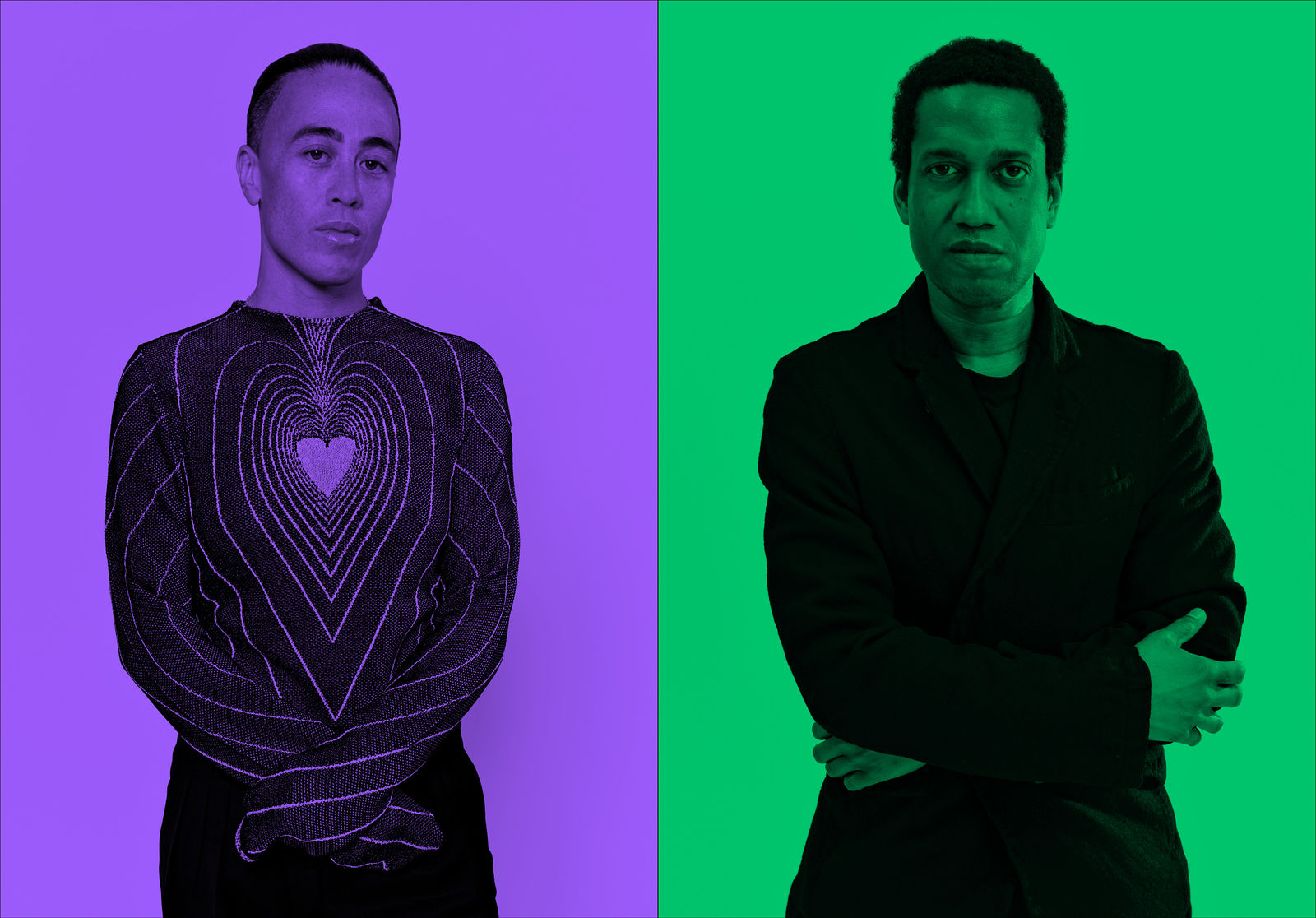Directors Talk:
Benjamin von Blomberg and
Nicolas Stemann
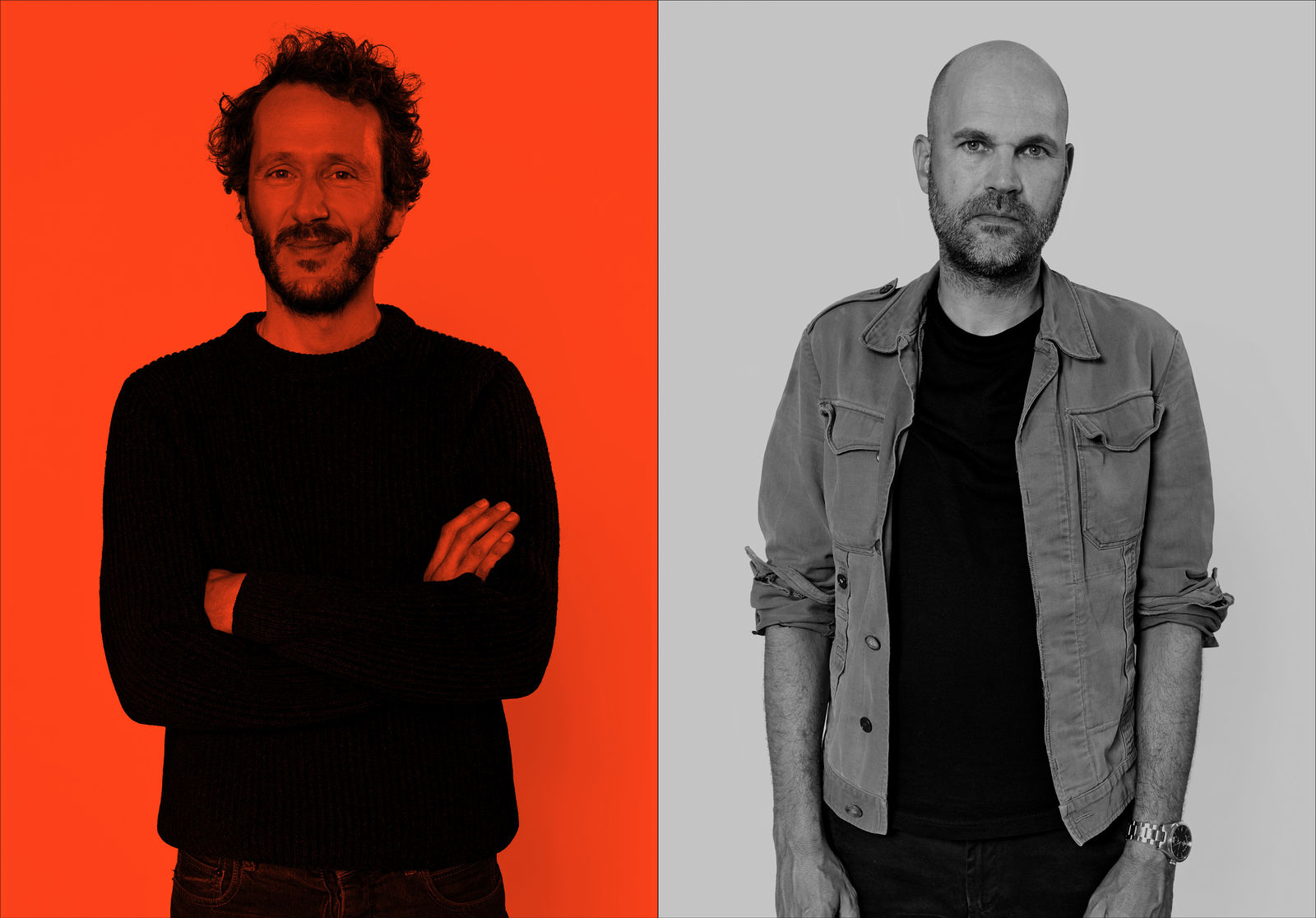
With the series Directors Talk you can bring our in-house directors Alexander Giesche, Suna Gürler, Trajal Harrell, Yana Ross, Christopher Rüping, Nicolas Stemann, Wu Tsang, and co-artistic director Benjamin von Blomberg along with you into the productions of the 2021/22 season in eight conversations. During the second lockdown they met on Zoom to talk about here, now, and tomorrow, mainly in pairs and once round-robin. The conversations are part of the season preview, which presents the 2021/2022 season and is available now in all our venues, as well as free to order online.
published on 13. August 2021
“How do you lead together, actually?”
Nicolas Stemann: Hello! Benjamin von Blomberg: Hello! Hi there, over at the Schiffbau. Hi there, in the Pippi Longstockings Theater. Come on, let’s jump in! OK, let’s jump in. What was last season like for you? Or: Do you still like being co-artistic director? I’ll take the question seriously, alright? Yup! OK. What I think is a shame is that Leonie [Böhm] will no longer be a resident director in the coming season. Yes, it really is! All the better that her work and the people she worked with will stay here. And we’ll continue showing Medea*, Leonce und Leonce, and there will be a guest performance of Räuberinnen from Munich for a series of performances. Who knows what else there’ll be… Yes, that’s true. There’s something is here to stay which will have a lasting effect. I really treasure Leonie, her work, and her way of working. So it just makes me all the more sad that she’s no longer involved. The possibility of something not working out and that you’ll go separate ways was, of course, part of it from the beginning. By connecting eight resident directors in one place, we started an insanely ambitious project. There’s no model for what we’re doing here. It’s pioneering work. This also now includes embracing the fact that something’s changing. How and why and in what direction it’s changing. I would like to understand that further and to grasp that. At first, there was a concept – and that created a reality. Now the concept has to orient itself to the reality and to the people. I’m excited for what kind of language and form we’ll find for the transformations of our project here at the Schauspielhaus. The reference point for me, however, will always be “the eight”. I’m still completely convinced about this structure. And then connected with that are the things I’m really happy about. About the things being created here right now! There are already so many works that will stay in my memory and are inscribed into the history of this theatre. I feel very connected to these works and to the people who made them. Didn’t we promise not to talk about Covid? That would be nice! But that’s not possible. I mean, this year became really exhausting because art often couldn’t be made due to Covid. The job of the artistic director instead became sheer bureaucratic absurdity: short time work, hygiene regulations, aerosol measurements. Yes, it was always hard to stand how much the theatre was missing beyond the organization of the theatre! Sensuality! Feelings! Contemplation! Instead, we speculated that heat would also arise when making plans. Oh well. The other thing that’s insanely demanding is the cultural change that we’re trying to bring about, which is placing high demands on all of us. How do you lead together, actually? How does diversity become a sensitively lived and factual culture and doesn’t stay a headline? How can we shape the Schauspielhaus Zürich with and for each other and while doing it mindful way? But back to your question: do you still like being the co-artistic director? I actually do. There hasn’t been any normality since the beginning of our directorship, and you’re so right: the sense of togetherness is missing, doing theater in front of people – the art! But there’s a crazy amount to do on the institutional level, which is exciting! We’re living in a time which is great for change and for rethinking outdated structures. It’s nevertheless painful that what’s at the heart of the matter can barely take place. I’ve luckily repeatedly found ways to continue being artistically active – we’ve found and fabricated many replacement stages, from performing in the church to music albums, books and, of course, online formats. It’s helpful, of course, that we’re doing it together and also that I’m still working as a director. That leads, however, to me being confronted less with artistic director tasks than you. I still feel that we’re a team of co-artistic directors, even in situations in which I’m not with you. And there are constantly situations in which people from the theatre approach either you or me. That means so much structurally and in terms of political power! You also have an artistic view of the shaping of the entire institution. That’s also why I’m still so convinced by our resident director model. Even if not all of the directors are interested in shaping the institution, some are even very critical of institutions, they don’t all attend working groups and meetings – all you directors are shaping the institution by making art. And you in particular can’t step away from your role as artistic director and thus shape the institution even when you’re actually directing. It’s my hope, of course, that that cross-pollinates and that I can make use of experiences from my artistic works at the institutional level. That’s what made me want to be an artistic director in the first place. But it’s not so easy, of course. What’s catapulting you most outside of your comfort zone at the moment? Well, whatever I do or say, I don’t say as Nicolas Stemann or as a good buddy or as a director, but always as an artistic director. That wasn’t clear to me when I started the job. And it takes time for that to become second nature. There’s also the power thing, of course, which I don’t especially benefit from, personally. I don’t think having power is cool, not even as a director. And I wonder: is it even possible to have artistic freedom with all those many layers of responsibility and power? I’m only realizing now that that freedom was a great privilege. Where do you think you’ll be in ten years? These are classic job interview questions. Have you ever asked a question like that in a job interview? No! Oh wait! I did once ask this to our audience developer Silvan Gisler – he didn’t know what to say… In ten years, the seas will be depleted from overfishing and the point of no return for the climate catastrophe will have long since passed. If we continue in the direction we’re headed. 15 or 20 years ago, I would have definitely said that I wouldn’t be in theatre anymore. I was wrong about that, which is why I’m very cautious about making such statements. Even so, I now think it’s a possibility. I’m always experimenting with other ways of being artistically productive, that frequently rise out of the medium anyway. The social aspect of theatre is great, of course – but maybe it’ll be more fun to be alone and write at some point. Maybe it has to do with age. Do you have an answer to the ten-year question? Whew. Sometimes I think it’s mostly a question of how long the inspirations and energy last. Actually, I’m constantly dealing with the question: is there no compelling alternative to what we’re doing!? It’s clear that I’ve only just started as an artistic director. But novice artistic directors have many questions like that in tow. At the end of the day, I think I’m searching for a context where I like being as a person. And the theatre was always the place where I most liked to be. Because there are people in the theatre who I felt reflected and seen and meant in a special and beautiful, gentle, and challenging way. And since becoming an artistic director, I sometimes land on difficult questions: whether you hit the right word and the right tone. Whether you’re even prepared for certain situations and ready to realize that you’re not equipped for every situation, that you’re only one perspective and can’t take in every perspective, that you can’t speak equally well for everyone and that you need to learn and unlearn an awful lot. That sometimes shortchanges Benjamin, the individual. But in the end, it’s simply a great job! And there’s no theatre but the Schauspielhaus Zürich that I’d like to be a part of shaping! A theatre where we’ll soon premiere Alte Dame¹ (yay! Segue!) Tell me: why the hell do you still stage classics? I haven’t for a while now. But with classical texts you can create a vital tension between the present and the past, that’s something genuinely theatrical. When it’s works, it’s a win-win-situation, both for the texts (especially for them!) but also for the present day and for the theatre, because you can find a completely different echo chamber than in contemporary texts. I share your enthusiasm for that echo chamber. In order to experience the inadequacy of language, which is our only instrument, but which is always inadequate, it helps to experience language coming from another time! And in doing so, to take a look at ourselves from a distance. Having access to documents that are written in one’s own language, but that are old, decades, even centuries old, is a privilege. If you have this privilege as a German-speaking institution, you ought to make use of it. I think this is an essential and epistemologically beneficial process. It’s important to listen to how others spoke, reflected, and felt in other times. It’s important to develop an awareness of the fact that some things repeat themselves in history. Productions of classics work for me if we’re wafted away from the present in the form a language that has seemingly grown old. And, as a person from today’s world, I see myself reflected, feel caught, perhaps – then it’s a closeness from a supposed distance which is pure happiness for me. And that can be harrowing. That’s why I’m really looking forward to the Alte Dame! Well, I’m not so sure if the Alte Dame is or can be classified as a classic. After all, it’s still relatively young to be a classic, and was written in a very specific time and for a specific form of theatre. It’s very good, of course, embedded in that time. Ten years after the end of the war, Dürrenmatt poses the question of guilt and in doing so picks up on the diffuse fear that a corpse from the past that nobody knew about, or possibly did know, but which everyone collectively escaped, might reappear. The collapse of civilization during the Nazi era is mirrored onto the period of the “economic miracle.” Going along with it supersedes the guilt. To me, this analysis is the really great thing about the play. This can be applied to our present day, of course – we’re all involved in producing the greatest catastrophe in earth, but constantly manage to deny it. Instead, there’s moral outrage, everybody against one, much like with the shitstorms of our time. If you read it closely, all of these topics are laid out in the piece. Do you think that Der Besuch der alten Dame is a classic? I don’t know. I’m not quite sure about the language and the form. But what I am sure of is that Dürrenmatt had a flair for thematic parable-like tension which is beyond all time and doubt: what happens if we’re all suddenly haunted by guilt, and blind spots appear? And what if this unprocessed guilt strikes back, even beyond measure? What’s the relationship between guilt and responsibility? What kind of concept of justice can be discerned from it? How free are people to deal with mistakes in that respect? And what can be made of looking at past mistakes from the present day? The invention of this female figure who returns home after decades and wants revenge – or justice, for that matter – and makes the tempting offer to establish alleged justice through money and a murder, is, I think, genius. It’s brilliantly constructed, and most certainly classical. It will outlive us. The play will outlive us. I’m sure of that.
1 Not as a birthday present on the actual day due to Covid, but Nicolas Stemann will still stage Friedrich Dürrenmatt’s Der Besuch der alten Dame during his 100th birthday year, 65 years after the world premiere, as the opening production of the 2021 / 22 season of the stage of Pfauen.
